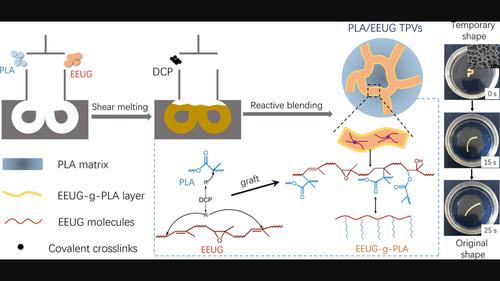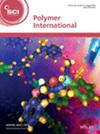Yan Wang, Xianqiang Pei, Qianyao Pei, Zhancheng Zhang, Yaoming Zhang, Qihua Wang, Tingmei Wang
求助PDF
{"title":"Shape memory polylactic acid/modified Eucommia ulmoides gum thermoplastic vulcanizates based on excellent interfacial adhesion and co-continuous structure","authors":"Yan Wang, Xianqiang Pei, Qianyao Pei, Zhancheng Zhang, Yaoming Zhang, Qihua Wang, Tingmei Wang","doi":"10.1002/pi.6612","DOIUrl":null,"url":null,"abstract":"<p>Towards the goal of developing renewable, biocompatible and intelligent polymer materials, natural <i>Eucommia ulmoides</i> gum (EUG) was modified via epoxidation and then the epoxidized EUG (EEUG) was compounded with another sustainable and biobased polymer, polylactic acid (PLA), to develop shape memory thermoplastic vulcanizates (TPVs) through reactive blending. The prepared PLA/EEUG TPVs displayed not only enhanced toughness but also greatly improved shape recovery ability, which was generated from the co-continuous phase structure and excellent interfacial adhesion induced by <i>in situ</i> compatibilization during reactive blending. It is shown that dicumyl peroxide content exerted little influence on the toughness of the TPVs. However, heat-triggered shape memory effects of the TPVs were significantly affected by the dicumyl peroxide content with a decrease in deformation ratio (Δ<i>ε</i>) from 163.51% to 128.36% and an increase in shape recovery ratio (<i>R</i><sub>r</sub>) from 73.32% to 91.93%. The findings of the present study offer an idea for the industrialization of biocompatible and smart materials for biomedical applications. © 2024 Society of Industrial Chemistry.</p>","PeriodicalId":20404,"journal":{"name":"Polymer International","volume":"73 6","pages":"435-445"},"PeriodicalIF":2.9000,"publicationDate":"2024-01-23","publicationTypes":"Journal Article","fieldsOfStudy":null,"isOpenAccess":false,"openAccessPdf":"","citationCount":"0","resultStr":null,"platform":"Semanticscholar","paperid":null,"PeriodicalName":"Polymer International","FirstCategoryId":"92","ListUrlMain":"https://onlinelibrary.wiley.com/doi/10.1002/pi.6612","RegionNum":4,"RegionCategory":"化学","ArticlePicture":[],"TitleCN":null,"AbstractTextCN":null,"PMCID":null,"EPubDate":"","PubModel":"","JCR":"Q2","JCRName":"POLYMER SCIENCE","Score":null,"Total":0}
引用次数: 0
引用
批量引用
Abstract
Towards the goal of developing renewable, biocompatible and intelligent polymer materials, natural Eucommia ulmoides gum (EUG) was modified via epoxidation and then the epoxidized EUG (EEUG) was compounded with another sustainable and biobased polymer, polylactic acid (PLA), to develop shape memory thermoplastic vulcanizates (TPVs) through reactive blending. The prepared PLA/EEUG TPVs displayed not only enhanced toughness but also greatly improved shape recovery ability, which was generated from the co-continuous phase structure and excellent interfacial adhesion induced by in situ compatibilization during reactive blending. It is shown that dicumyl peroxide content exerted little influence on the toughness of the TPVs. However, heat-triggered shape memory effects of the TPVs were significantly affected by the dicumyl peroxide content with a decrease in deformation ratio (Δε ) from 163.51% to 128.36% and an increase in shape recovery ratio (R r ) from 73.32% to 91.93%. The findings of the present study offer an idea for the industrialization of biocompatible and smart materials for biomedical applications. © 2024 Society of Industrial Chemistry.
基于优异界面粘合力和共连续结构的形状记忆聚乳酸/改性杜仲胶热塑性硫化弹性体
为了实现开发可再生、生物相容性和智能聚合物材料的目标,研究人员通过环氧化作用对天然杜仲胶(EUG)进行改性,然后将环氧化杜仲胶(EEUG)与另一种可持续生物基聚合物聚乳酸(PLA)进行共混,通过反应共混开发出形状记忆热塑性硫化弹性体(TPVs)。制备的聚乳酸/EEUG 热塑性硫化弹性体不仅增强了韧性,还大大提高了形状恢复能力,这得益于反应共混过程中的共连续相结构和原位相容诱导的优异界面粘附性。研究表明,过氧化二辛酯含量对热塑性硫化弹性体的韧性影响很小。然而,热引发的热塑性硫化弹性体形状记忆效应受到过氧化二异丙苯含量的显著影响,变形率 (Δε) 从 163.51% 下降到 128.36%,形状恢复率 (Rr) 从 73.32% 上升到 91.93%。本研究的发现为生物医学应用中生物相容性和智能材料的工业化提供了思路。© 2024 工业化学学会。
本文章由计算机程序翻译,如有差异,请以英文原文为准。


 求助内容:
求助内容: 应助结果提醒方式:
应助结果提醒方式:


